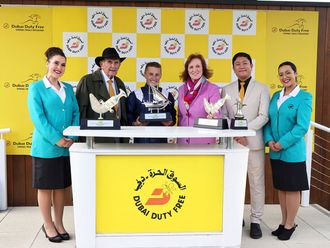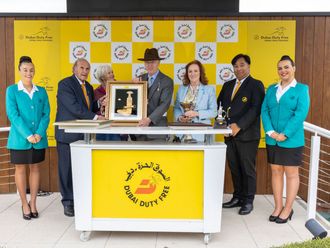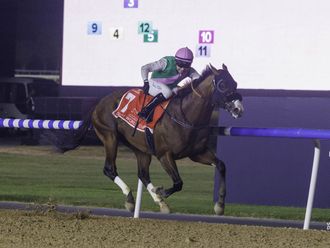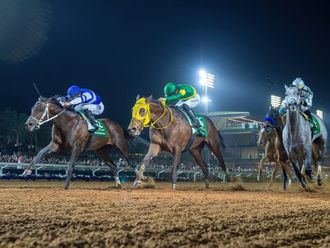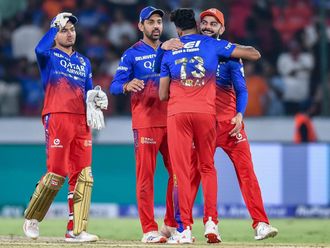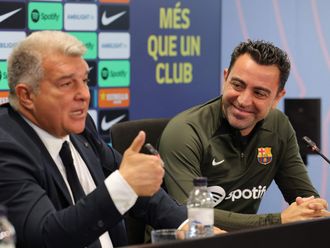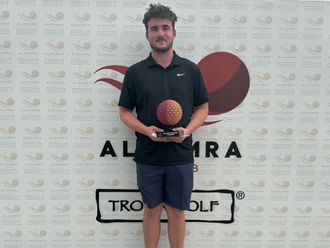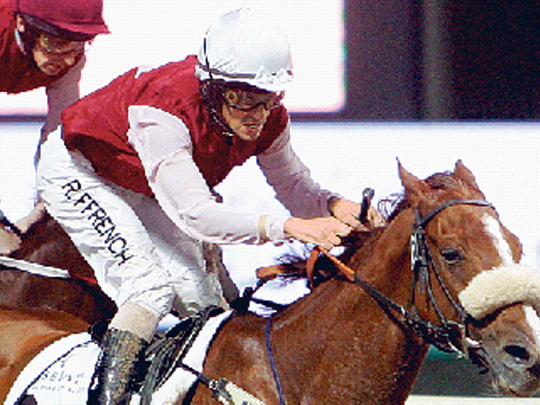
Dubai: They say horse racing is the sport of kings but you needn’t be a millionaire to own a prized thoroughbred.
If the Dh50,000 to Dh1 million asking price for a new racehorse seems steep, syndicates such as Dubai-based Emirates Entertainment Racing Club (EERC) sell shares of a racehorse so everyone can now get a slice of the action.
But say for instance you buy a ten per cent share of the horse, you will also have to pay ten per cent of the monthly running costs, such as jockey fees, training fees and veterinary fees, which total around Dh100,000 per annum.
That said, you will also be entitled to ten per cent of the winnings, which - if the horse wins a carnival race, could total as much as Dh300,000.
If the horse is sold you take ten per cent of the sale and if the horse breeds you take 10 per cent of its lineage. But likewise, if the horse gets injured and doesn’t race again, you lose your investment.
Alternatively, if the horse is good enough to get an invite to Dubai World Cup night, you would have to pay ten per cent of the Dh350,000 entry cost. But if it wins the main event there awaits a hallowed Dh22million to be divided from the richest race on earth.
If you want to spread your vested interest and take more enjoyment from the races, your 10 per cent share can also be split over more than one horse in the group’s portfolio.
And if the running costs put you off there’s an option to lease, involving a one-off payment for the UAE racing season, from November to March, of Dh10,000, which - last season - covered seven horses. That entitles you to a three per cent share of the horse and its winnings after deductions.
The syndicates’ biggest success story to date is Kilt Rock, a horse bought for Dh90,000 in 2010 rated 67, and which has now won its co-owners over Dh630,000 in UAE prize-money alone over the past three years hitting a rating peak of 109.
But EERC founder Justin Byrne, who started the group in 2006, warned syndicates are not about making money and said all of the profit ultimately goes back into managing other horses in the portfolio.
“It’s a passion, not a business. Nobody would run a business that costs you money,” said Byrne. “Horses are the same as cars and yachts. The day you buy them you’ve already lost half your investment. It’s just a way to enjoy the sport more. I could probably have two horses here if I was doing this alone but with a syndicate you can have eight or nine horses.”
EERC in fact have six horses at present following recent retirements, owned across 45-50 members from all over the world – a collective Byrne refers to as his extended family.
“When you have a big win there’s nothing like being part of a syndicate,” he said. “You experience a whole range of different emotions. You might have only said two words to one another in six months but suddenly you are all hugging one another and cheering, and you become friends for life. That’s something you just don’t get as a single owner.”
Long time syndicate member Peter Gaskin said a love of racing unites the group, which also enjoys regular socials and stable visits as well as hospitality passes to every race.
“It’s for people who love racing but can’t otherwise afford to get involved,” said Gaskin. “It’s about pulling all your resources together and hopefully getting some wins.
Common ground
“Any win is absolutely fantastic. A few weeks ago I was able to lead First Knight back into the paddock after it won at Jebel Ali and that was a hell of a kick. We take it in turns to pick up the prizes and bring the horses in.
“We are all from different cross sections of society but find common ground in our passion for racing. We all love going racing anyway but it gives it an added spark when we are all together and have a horse running. It’s about people and horses.”
EERC has had over 40 winners in the last four years and one Dubai World Cup night runner – Prince Shaun, which finished 15th in the Al Quoz Sprint in 2010. With that in mind the collective takes pride in punching above its weight.
“Some owners can spend a million on a horse and it doesn’t matter if it turns out to be unsuccessful. That’s a great position to be in,” said Byrne. “But we really have to know what we are doing and do it well or we will lose.
“We also look for different things, for instance when Prince Shaun came fourth on Super Saturday to qualify for World Cup night in 2010, we celebrated as heartily, if not more, than the winning owner. For a small syndicate to get its first World Cup runner in the first event held at Meydan was a massive deal.
“This season we’ve had seven horses run 42 times with five wins, which is a decent strike rate when you consider others have had 15 horses, run 80 races with just two wins. We know we are the underdogs, we are the schoolboys in the big field, but we do well for ourselves and we have more good results than bad.”


